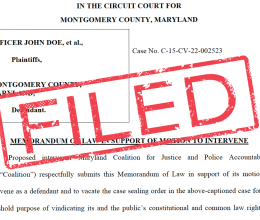
MONTGOMERY COUNTY, MD – Today, elected and community leaders held a press conference before a court hearing about the dangerous legal effort made by the Fraternal Order of Police Lodge 35 (FOP) in Montgomery County to gut Anton’s Law, which would block the public’s hard-earned access to police misconduct records. The Maryland Coalition for Justice and Police Accountability (MCJPA) filed a motion to intervene in the FOP case, and is asking the court to unseal proceedings and to reject the FOP lawsuit. Montgomery County Councilmember Will Jawando, Anton’s Law bill sponsor Delegate Gabriel Acevero, and leaders with MCJPA and the Silver Spring Justice Coalition spoke out against the unacceptable actions of the FOP and why Anton’s Law is so necessary to the work of community transparency and police accountability.
Dayvon Love, from Leaders of a Beautiful Struggle and MCJPA, said: “Anton’s Law is one of the most important transparency and accountability bills the General Assembly has passed in decades. The police have long needed policing. The FOP’s lawsuit is a frontal attack on the law, seeking to judicially gut it, and achieve in the courts what they couldn’t achieve in the General Assembly. The FOP’s arguments reveal their true intent, to try to set itself up as a substitute custodian of these records, making the discretionary decisions about when release is appropriate, rather than the government officials to whom the law gives that power.”
After five years of persistent activism, led by MCJPA, in 2021, the Maryland General Assembly passed Anton’s Law, named in honor of Anton Black, an unarmed Black teenager who was killed in a police encounter on Maryland’s Eastern Shore in 2018. In an effort to build community trust in the police, gain transparency, and foster accountability, Anton’s Law allows records relating to administrative investigations of misconduct by a police officer to be disclosable to the public, with narrow exceptions. The entire purpose of Anton’s Law was to legislatively ensure that these records would no longer be treated as secret personnel records.
The FOP’s lawsuit was made possible by a side deal negotiated between Montgomery County and the local FOP, following the passage of Anton’s Law. The county agreed to notify any officers whose file is the subject of an MPIA request (along with the FOP) within two days, and to give the officer and FOP 10 days to review any records the county intends to produce, to specifically allow them to file a lawsuit to block the release.
The FOP’s deal with Montgomery County is improper and unacceptable. Anton’s Law already includes an explicit notice provision that precludes the arrangement in the side deal. The law provides that an officer is to receive notice of a request when the records are “inspected,” which occurs when they are provided to the requestor, not when the request is made. And the side conflicts with the MPIA’s long-standing command that records be produced “immediately” when they are available, and not ten days later.
“The side deal that the County entered into with the FOP is not something the county had to do, or even bargain about, and the County does not extend the same treatment in any other context,” said David Rocah, senior staff attorney for the ACLU of Maryland. “And the fact that the County consented to the FOP’s improper request to conduct all of the legal briefing in this case under seal, in secret, and reversed position only when prompted by the proposed intervenors in the case, is beyond appalling. If there is any case that should not be litigated in secret, it is the FOP’s attempt to undermine this critically important transparency law.”
The FOP’s lawsuit is also improper because such reverse MPIA claims are allowed only when the records at issue are prohibited from disclosure. Anton’s Law established that these records would no longer be prohibited from disclosure, making all of the legal claims made in the case unavailable to the officer or the FOP.
MCJPA and the ACLU of Maryland are motivated to step into the courts to protect Anton’s Law because countless reports of the police killing and brutalizing Black and disabled Marylanders cannot continue to be ignored. Ending police violence against Black and disabled Marylanders who continue to face the brunt of police brutality and police killings must be a top priority for the courts. Our laws must reflect this goal and protect Black and disabled lives.
Plaintiffs are represented by Mary Borja and Ashley Criss from Wiley Rein, and by Deborah Jeon, David Rocah, Sonia Kumar, and Nick Taichi Steiner from the ACLU of Maryland.
##






